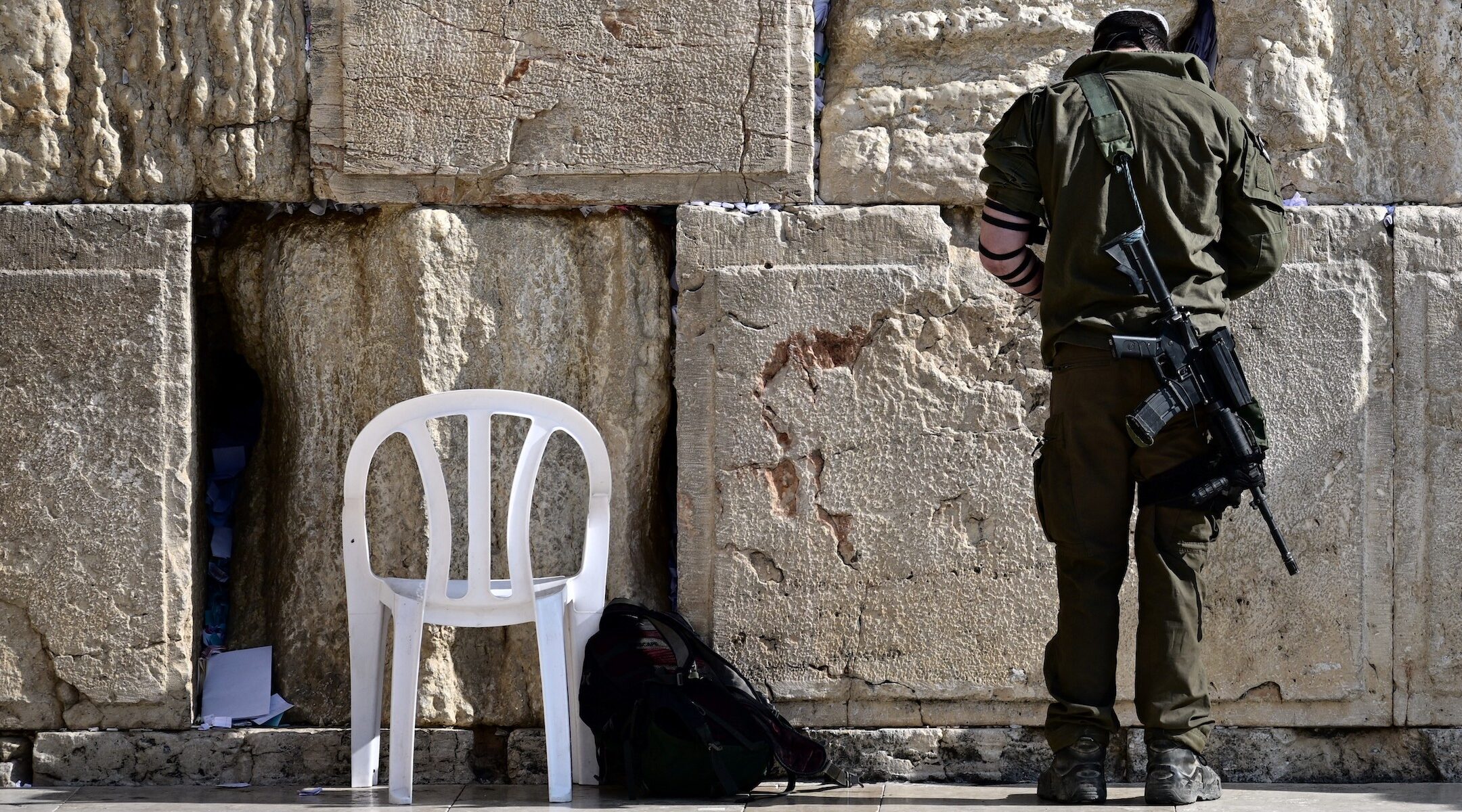(JTA) — I often take solace in prayer: It gives me the opportunity to express my deepest longings to God, even if immediate results are never the goal. As the Israel-Hamas war has worn on, I have unexpectedly connected to a prayer I have long found difficult, one that deals with external political threats to the Jewish people — in terms that can feel uncomfortable.
The 12th blessing of the Amidah, the central prayer of every Jewish worship service, is actually a curse against enemies of the Jewish people. One line focuses on external enemies; it has expanded over the years, but the original curse (preserved in the siddur of Rav Saadia Gaon, a prayer book dating back more than 1,000 years ago) reads:
And the kingdom of insolence: speedily uproot it in our days.
This blessing is simple and straightforward. It identifies a political entity — signified by the word “malkhut,” or kingdom — that must be uprooted — “te’aker,” in Hebrew. Israel does not — and has never — existed in a world without enemies. The core DNA of our daily prayer includes a moment to recognize this threat and pray for our enemies to be neutralized.
And yet I have not always connected with this prayer. I grew up in an era in which I believed we were hurtling towards peace — with Communist countries, and with Arab nations. When I was younger, I often felt this line to be obsolete, even a little embarrassing. It seemed to represent an old view of reality, irrelevant in a world in which peace had broken out. At best, I could reinterpret this line (following Rabbeinu Behaye, the medieval Spanish commentator) as a reference to our own evil inclination, that we hoped to subdue.
In this challenging time, I have found that taking a closer look at the line and its journey throughout Jewish history has helped me achieve one of the central goals of prayer: to clarify our values through the words we say to God.
I am not the only one to have distanced myself from this line. As the Jewish studies scholar Ruth Langer has shown, while external authorities introduced censored versions of this blessing starting in the Middle Ages, already in the 19th century many Jews themselves were sheepish about reciting it and self-censored. In America, this blessing was removed from Reform liturgy for more than 100 years, and it never appeared in Reconstructionist liturgy. Following censored texts from the Middle Ages, Conservative and most Orthodox prayer books altered the “kingdom of insolence” to simply read “the insolent.” Over the years, I have heard prayer leaders recite this blessing in a subdued tone, saying it only out of obligation to tradition, while attempting to literally mute its message.
But we have learned time and again that a world of peace without political enemies is far from our reality. Indeed, the Reform movement restored this blessing in the 1990s, including the line asking for the “malkhut zadon,” the kingdom of insolence, to be smashed. After Oct. 7, I am reminded of the relevance of these words yet again. It is time we return to these words and say them with conviction and focus.
Our prayers are not meant to exist in a world divorced from reality; rather, they are meant to address the real lives we are living. Political entities always have attempted — and continue to attempt — to harm the Jewish people. Indeed, the reference text for the original “kingdom of insolence” in the Bible is the kingdom of Babylon that destroyed the First Temple. Later this “kingdom of insolence” was associated with Rome, which also destroyed our sovereign nation. The Amidah — our most central prayer —recognizes these real enemies, and offers us the opportunity to actively pray for their defeat.
Even as I connect to these words anew, I want to note what we are — and are not — praying for. The request is to uproot our enemies, based on Zephaniah 2:4 (understood in the Talmud to also refer to Rome). It is not a call for revenge for its own sake, or even outright death (although some later versions include harsher words). The 14th-century prayer book commentator Rabbi David Abudraham asks, “How can we offer curses in our Amidah?” In answering his own question, he notes that our blessing differs from a curse uttered to kill evildoers (forbidden by the Talmud), because, among other differences, our blessing does not call for explicit destruction.
We are not cursing our enemies with a call for their death; we are offering a prayer that they be stopped. To be sure, some Jews might view this prayer as a call for bloody and indiscriminate revenge, as some Israeli government ministers have recently called for in Gaza. I think that is a perversion of the spirit of the prayer. In fact, one 19th-century authority claimed that we cannot be praying for the death of evil people, because one is not allowed to do so:
The issue is not the destruction and wiping out entirely [of enemies] for one cannot pray for the destruction of sinners, only sins. (Iyun Tefilah of Tzvi Meckelberg)
So I pray that our enemies be thwarted. This includes waging war and other physical acts to stop this political entity. It may indeed lead to the death of our enemies; it may also include negotiated solutions. The specifics are not legislated in the prayer, but the essential message is that the kingdom be uprooted — rendered ineffective in its attacks on Israel. In these times, I invite us to reconnect to those words, and bring intention to our daily prayer: May our enemies be uprooted, speedily.
JTA has documented Jewish history in real-time for over a century. Keep our journalism strong by joining us in supporting independent, award-winning reporting.







